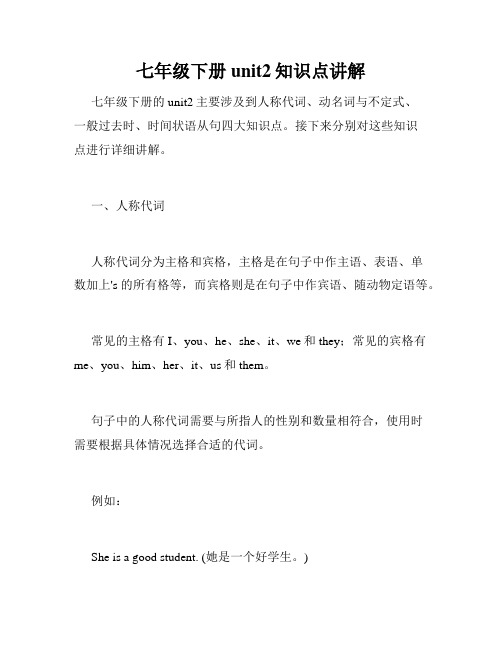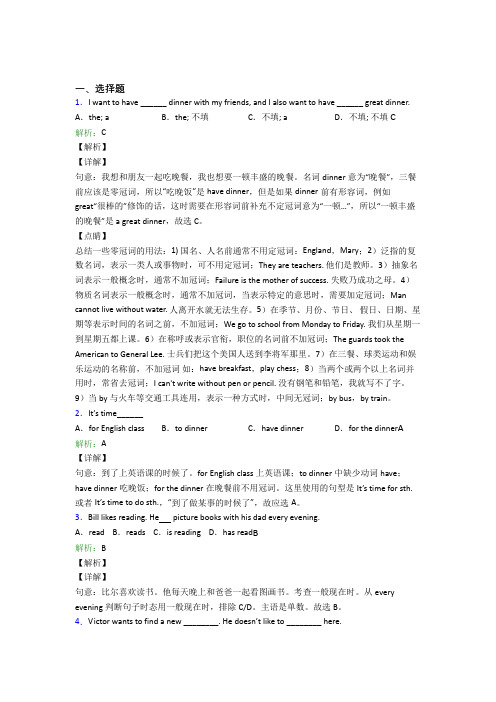七下unit2 复习提纲(1)
七年级下册unit2知识点讲解

七年级下册unit2知识点讲解七年级下册的unit2主要涉及到人称代词、动名词与不定式、一般过去时、时间状语从句四大知识点。
接下来分别对这些知识点进行详细讲解。
一、人称代词人称代词分为主格和宾格,主格是在句子中作主语、表语、单数加上's的所有格等,而宾格则是在句子中作宾语、随动物定语等。
常见的主格有I、you、he、she、it、we和they;常见的宾格有me、you、him、her、it、us和them。
句子中的人称代词需要与所指人的性别和数量相符合,使用时需要根据具体情况选择合适的代词。
例如:She is a good student. (她是一个好学生。
)I gave him a book. (我给了他一本书。
)二、动名词与不定式动名词与不定式常用于表示动作或状态,常常作为主语、宾语、表语、定语等成分。
动名词和不定式的主要区别在于,动名词作为主语时更侧重于实际情况,而不定式则更多地考虑结果和目的。
动名词常常用于表示做某些事情的过程,例如:Playing basketball is my hobby. (打篮球是我的爱好。
)不定式则用来表示需要完成某项任务或达到某个目标,例如:I want to learn English. (我想学好英语。
)三、一般过去时一般过去时表示过去的动作或状态。
一般过去时的动词主要分为规则动词和不规则动词。
规则动词的一般过去时是在动词原形后加上“-ed”,而不规则动词则需要根据具体的动词形式变化。
例如:He watched TV last night. (他昨晚看电视了。
)I went to the park last Saturday. (我上周六去了公园。
)四、时间状语从句时间状语从句,就是用来表示时间关系的从句,它常常在主句中充当时间状语。
常见的时间状语从句有:when、while、as、before、after、since、until等。
例如:I will go to bed as soon as I finish my homework. (我一完成作业就去睡觉。
人教版(新目标)初中七下期中复习Unit_2_Where's_the_post_office知识点归纳(1)

人教版(新目标)初中七下期中复习Unit 2 Where's the post office?知识点归纳一.重点短语归纳1 post office 邮局3 pay phone 公用电话4 across from 在…的对面5 Excuse me . 打扰6 have a good trip 愉快的郊游7 sth. begins /start . 某事开始8 have fun doing=enjoy doing= enjoy oneself=have a good time to do 玩的高兴,愉快9 take a taxi 打的10 on Guangming Avenue 在光明大道上11 on the bridge 在桥上12 in the neighborhood 附近in the neighborhood of my house 在我家附近13 go straight up/down 直直向上/下走14 turn left/right/back 向左/右/后15 on Fifth Ave 在第五大道16 Center Street(ST) 中心大街17 between…and…在…与…中间18 across from 在…对面19 next to 与…紧挨, 在…旁边20 around here 在这周围23 go straight 直走24 pass through 穿过25 go though 走过26 walk through 走路穿过27 go (out) for a walk (出)去散步28 have a walk=take a walk 散步29 visit + 人/地游览某地= pay a visit to sb/sw 游览某地, 拜访某人30come over to+人/地顺便拜访31 get to+地点= arrive at/in+地点=reach+地点到达某地35 welcome home/here/back 欢迎回家/来这/回来welcome to +地点欢迎到某地36 garden district 花园街区37 come to visit 来参观,来拜访38 on the way to+地点在去…的路上二、重点语法:1. library 图书馆。
人教版七年级下册Unit2知识点提纲

一重点单词1.up (adv.) 向上→down向下2.dress (v.)穿衣服(n.)连衣裙→dresses(pl.)3.brush (v.)刷刷净→brushes (单三)brush (n.)刷子→brushes(pl.)4.tooth(n.)牙齿→teeth(pl.)5.shower (v.)(n.)淋浴→shower(n.)淋浴器(间)ually (adv.)通常地;一般地→always总是→often经常→sometimes有时→ never 从不7.forty(num.)四十fifty (num.)五十8.never (adv)从不;绝不→seldom很少9.early(adv.)(adj.)早(的)→late迟地;迟的10.job (n.)工作;职业→jobs(pl.)11.work( v.)工作→works(单三)→work(un.)工作12.station(n.)电视台;车站→radio station 广播电台13.o'clock(adv.)(表示整点)…点钟14.night(n.)晚上;夜晚→day白天15.funny(adj.)奇怪的;滑稽好笑的→fun(adj.)有趣的16.exercise (v.)锻炼→exercise(un.)锻炼,运动exercise(c n.)→exercises(pl.)练习题,体操17.best (adj.& adv.)最好的(地)→good/well18.half (n.)一半,半数→halves(pl.)19.past (prep.)晚于;过(时间)past (adj.)过去的→past(n.)20.quarter (n.)一刻钟;四分之一=15分钟21.homework (un.)家庭作业22.run (v.) 跑;奔→runs(单三)→running(动名词)→runner(n.)(奔跑着)23.clean (v.)打扫;弄干净→cleans(单三)clean(adj.)干净的→dirty(adj.)脏的24.walk(n.)行走→walk(v.)步行25.quickly(adv.)很快地→quick(adj.)26.either ( adv.)或者;也(用在否定词组后)27.sometimes (adv.)有时28.taste(v.)有…的味道;品尝→tastes(单三)taste(n.)味道;滋味29..life(n.)生活,生命→lives(pl.)二、重点短语Section A1.go to school去上学2. get up起床3. get dressed穿衣服4. brush teeth刷牙5. eat breakfast 吃早饭6. take a shower洗澡7. what time 什么时间8. at six forty在六点四十9. an interesting job 一个有趣的工作10. at a radio station 在广播电视台11.go to work去上班12. your radio show你的广播节目13. from …..to从….到…..14. at night 在夜晚15. a funny time一个有趣的时间16. take exercise锻炼17. be late for…..因… 迟到18. at about ten twenty在大约十点二十19. on weekends在周末20. on school days 在上学日SectionB1. half past six 六点半2. a quarter past three三点过一刻(3:15)3. a quarter to ten十点差一刻(9:45)4. do (one’s)homework做(某人的)家庭作业5. take a walk散步=go for a work6. go to bed睡觉7. eat quickly 吃得快8. have much time有许多时间9. half an hour 半个小时10. get home到达家11. either…..or或者…….或者......12. eat a good breakfast好好吃顿早餐13. lots of = a lot of许多,大量14. be good for…..对…….有益15. taste good 尝起来好16. do her homework做她的家庭作业17. have a healthy life有一个健康的生活方式18. have dinner 吃晚饭19. play sports 做运动20.clean my room清理我的房间21.go to bed early 很早上床睡觉22.go home回家三、重点句子Section A1.What time do you usually get up?你通常几点去起床?2.I usually get up at six thirty.我通常6点30 起床.3.What time do you usually take a shower,Kick?瑞克,你通常几点钟淋浴?4.I usually take a shower at six forty.我通常六点四十淋浴。
七年级下册unit2知识点归纳

七年级下册unit2知识点归纳七年级下册英语第二单元主要学习了一些关于日常活动和时间的词汇和短语。
以下是本单元涉及到的一些关键知识点的归纳总结。
一、时间1. 时间的表达方式时间的表达方式主要有以下几种:数字、点钟(o’clock)、半小时(half)、表示分钟的数字、上午(AM)、下午(PM)等。
比如,你可以用以下方式表达时间:- It’s 4 o’clock.(现在是4点。
)- It’s half past two.(现在是两点半。
)- It’s ten to six.(现在差十分六点。
)- It’s a quarter to nine.(现在差15分9点。
)- It’s twenty past twelve.(现在是十二点二十分。
)2. 时间的询问与回答询问时间时可以说:What’s the time? 或者What time is it? 等。
回答时就可以用上述时间表达方式进行回答。
二、日常活动在日常活动的学习中,我们需要学会如何表达一些常见的活动和注意事项。
1. 日常活动一些常见的日常活动包括:get up(起床)、havebreakfast/lunch/dinner(吃早饭/午饭/晚饭)、go to school(上学)、do homework(做作业)、watch TV(看电视)等。
2. 注意事项在表达注意事项时,我们需要掌握如何表达禁止和提醒。
比如:- Don’t be late.(不要迟到。
)- Keep quiet in the library.(在图书馆中保持安静。
)三、一般现在时在学习日常活动时,需要掌握一般现在时的用法。
一般现在时用于表示经常性、习惯性或客观事实。
比如:- I go to school by bus.(我坐公交车去学校。
)- He often reads books in the library.(他经常在图书馆看书。
)四、词汇在本单元的学习中,我们也需要掌握一些词汇。
七下----第二单元----复习提纲

第二单元复习复习内容:七年级思想品德第二单元内容复习目的:通过复习,进一步引领学生养成自立的生活态度。
养成自信自立的生活态度,树立为人民、为社会服务的远大志向,体会自强不息的意义。
复习方法:归纳法、练习法、案例分析法等。
复习过程:一、自主记忆第三课《走向自立人生》1、什么是自立?自立,就是自己的事情自己干。
2、自立的表现:自立的表现在生活的方方面面,即学习自立,生活自立,处理社会问题自立①独立地科学地安排自己的生活,解决自己生活中的问题;②自主地科学地安排自己和学习,处理自己学习中的问题;③自主处理自己所遇到的社会问题,靠自己开创自己的事业。
具体举例:自己衣服自己洗;父母不在时,自己做饭;自己去超市、书店等。
3、自立的作用:自立的过程,是我们生活水平的锻炼过程,也是心理和道德品质的锻炼过程。
4、为什么需要自立?(自立的意义)答:人生需自立。
如果我们不能从现在起,自觉地储备自立的知识,锻炼自立的水平,培养自立的精神,就难以在未来的社会中立足。
5、自立不是拒绝协助,依靠不是依赖。
6、依赖思想有何危害?P40❶会使人丧失独立生活的水平和精神,会使人缺乏生活的责任感,造成人格的缺陷。
❷只想不劳而获,贪图享受,就不能适合社会生活,甚至危害社会和他人,走上违法犯罪的道路。
7、怎样告别依赖,走向自立?❶从思想上理解到依赖的危害,主动告别依赖;❷学会自主,它是自立的前提条件;❸立足当前的生活、学习中的问题,从小事做起;❹还应大胆地投身社会生活实践,反复锻炼,持续实践。
(培养自立水平的最好办法是投身社会实践,反复锻炼,持续实践。
)8、自己的事负责的前提是要。
自主就是遇事有主见,能对自己的行为负责。
自主不但是一种权力,更是一种水平。
9、我们应该怎样培养自己的自立水平呢?①培养自己的自立水平最基本的是立足于自己当前的生活、学习中的问题,从小事做起。
②培养自己的自立水平还大胆地投身社会生活实践,多实践、多锻炼。
10、自立的名言:❶滴自己的汗,吃自己的饭。
西安交通大学附属中学初中英语七年级下册Unit 2知识点(培优)(1)

一、选择题1.I want to have ______ dinner with my friends, and I also want to have ______ great dinner. A.the; a B.the; 不填C.不填; a D.不填; 不填C解析:C【解析】【详解】句意:我想和朋友一起吃晚餐,我也想要一顿丰盛的晚餐。
名词dinner意为“晚餐”,三餐前应该是零冠词,所以“吃晚饭”是have dinner,但是如果dinner前有形容词,例如great“很棒的”修饰的话,这时需要在形容词前补充不定冠词意为“一顿…”,所以“一顿丰盛的晚餐”是a great dinner,故选C。
【点睛】总结一些零冠词的用法:1) 国名、人名前通常不用定冠词:England,Mary;2)泛指的复数名词,表示一类人或事物时,可不用定冠词;They are teachers. 他们是教师。
3)抽象名词表示一般概念时,通常不加冠词;Failure is the mother of success. 失败乃成功之母。
4)物质名词表示一般概念时,通常不加冠词,当表示特定的意思时,需要加定冠词;Man cannot live without water. 人离开水就无法生存。
5)在季节、月份、节日、假日、日期、星期等表示时间的名词之前,不加冠词;We go to school from Monday to Friday. 我们从星期一到星期五都上课。
6)在称呼或表示官衔,职位的名词前不加冠词;The guards took the American to General Lee. 士兵们把这个美国人送到李将军那里。
7)在三餐、球类运动和娱乐运动的名称前,不加冠词如:have breakfast,play chess;8)当两个或两个以上名词并用时,常省去冠词;I can't write without pen or pencil. 没有钢笔和铅笔,我就写不了字。
人教版初一七年级英语(下)第二单元Unit2知识点+语法整合
⼈教版初⼀七年级英语(下)第⼆单元Unit2知识点+语法整合Unit 2 What time do you go to school ?Section A1._____________:穿⾐服+颜⾊/⾐服:穿着……2.brush one’s teeth 刷⽛brush n. 刷⼦(复数:_________);v. 刷3.take a shower=___________________ 洗澡4.①what time 询问具体时间,⼀般回答要具体到⼩时;②when询问⽇期、⽉份、年份,回答既可是具体的时间,也可是不具体的时间,in the morning,last year,in 1998 等范围⼤的时间,When does he take a shower?他什么时候洗澡?He takes a shower in the morning. 他在早上洗澡。
I take a shower at 6 o’clock in the morning.我早上六点洗澡。
4.at/ in/ on(1)at + 具体时间点,在⼏点(⼏分)at 7:00,at night,at noon(2)in + 时间段(周,年份,⽉份,季节,早中晚)in 1942,in the morning,in May(3)on + 星期/⽇期/节⽇或具体某⼀天的早中晚on a cold winter night,on Children’s Day,on Monday5. always/ usually/ often/ sometimes都属于___________,常⽤于动词be 助动词或情态动词之后,⾏为动词之前。
(1)always(100%) 总是、永远,表动作重复,状态继续,中间没间断,通常修饰动词的⼀般时态。
若修饰进⾏时,则有“⽼是”,“再三地”的意思,带有厌烦、不满、赞美等感情⾊彩。
(2)usually(80%)通常,着重表⽰已习惯的动作。
牛津译林版七年级下册英语 Unit2 知识点总结-最新
牛津译林版七年级下册英语Unit2 知识点总结一、重难点汇总解析1. welcome sb. 欢迎某人. welcome to sp. 欢迎到某地. You are welcome. 没关系/ 不用谢。
2. like 像. visitors like you 像你这样的拜访者. a new neighbourhood like that 一个像那样的新街区. a bike like yours 像你的一样的一辆自行车3.be afraid of sth. .eg. I am afraid of ghosts. 我害怕鬼。
. be afraid to do…. eg. I am afraid to go out at night. 我害怕在晚上出去。
. be afraid that 从句(委婉语气,表示说话人的担心或看法). I am afraid (that) he won’t come tomorrow afternoon.我恐怕他明天下午不会来。
. I am afraid not. 我恐怕不是(能)。
/ I am afraid so. 我恐怕是这样。
4. in Ninth Street 在第九大街. in your neighbourhood 在你的街区. around your neighbourhood 在你的街区周边5. It’s good to live in a neighbourhood like that.住在像那样的一个街区是很好的。
. It is + adj. + to do …做某事怎么样. eg. It is bad to talk in class. 在课上讲是不好的。
6. help us with all kinds of problems 帮助我们解决各种问题. all kinds of …各种各样的……. different kinds of …不同种类的……. a kind of …一种……7. have a meeting 开会. have a class meeting 开一次班会. have a parents’ meeting 开一次家长会. have a sports meeting 开一次运动会8. There is something wrong with my computer. 我的电脑出了一些毛病。
七年级英语下Unit2知识点归纳与复习人教新目标版
七年级英语下Unit2知识点归纳与复习人教新目标版Unit 2: Knowledge Summary and ReviewIn the second unit of our seventh-grade English course, we have covered various topics that will help us in our language learning journey. To reinforce and consolidate what we have learned so far, let's summarize and review the key points of Unit 2.1. AdjectivesAdjectives are words that describe or modify nouns. They provide additional information about the noun. Remember that adjectives answer the questions: What kind? Which one? How many? They usually come before the noun they modify. For example, "a beautiful flower" or "three delicious apples."2. ArticlesArticles are a kind of determiner and come before nouns. In English, there are three articles: "a," "an," and "the." "A" and "an" are indefinite articles, used when referring to a non-specific noun. "The" is a definite article, used when we are referring to a specific noun. For example, "an apple" or "the school."3. Possessive PronounsPossessive pronouns show ownership or possession. They include words like "my," "your," "his," "her," "its," "our," and "their." Unlike possessiveadjectives, possessive pronouns do not require a noun after them. For example, "Is this pen yours?" or "The book is mine."4. Past Tense of Regular VerbsRegular verbs follow a specific pattern when conjugated in the past tense. We add "ed" to the base form of the verb. For example, "walked," "talked," or "played." However, there are some exceptions and irregular verbs that do not follow this pattern, like "go-went" or "come-came."5. Simple Present TenseThe simple present tense is used to talk about general truths, habits, routines, and scheduled events. It is formed by using the base form of the verb, except for the third-person singular where we add "s" or "es" to the verb. For example, "He plays tennis every Sunday" or "She never eats meat."6. Prepositions of TimePrepositions of time are used to show when an action or event takes place. Some common prepositions of time are "in," "on," and "at." "In" is used for longer periods of time, like months, years, or seasons. "On" is used for specific days or dates, and "at" is used for a specific time. For example, "I will visit my grandmother in July," "We have a math test on Monday," or "The movie starts at 7 p.m."7. Wh-QuestionsWh-questions are questions that begin with "wh-" words, such as "what," "where," "when," "who," "why," and "how." These questions are used togather information. For example, "Where is the library?" or "How do you get to school?"8. Comparative and Superlative AdjectivesComparative adjectives are used to compare two things, where superlative adjectives are used to compare three or more things. To form comparative adjectives, we add "-er" to short adjectives or use "more" before long adjectives. To form superlative adjectives, we add "-est" to short adjectives or use "the most" before long adjectives. For example, "She is taller than her sister" or "This is the most beautiful song I've ever heard."9. Present Continuous TenseThe present continuous tense is used to describe actions that are happening right now or around the present moment. It is formed by using the verb "to be" in the present tense and adding the present participle "-ing" to the base form of the verb. For example, "They are playing soccer" or "We are studying for the exam."Throughout Unit 2, we have explored these essential grammar points in English. By understanding and practicing these concepts, we can enhance our language skills and improve our overall proficiency. Remember to review regularly and apply these knowledge points in your everyday English communication. Keep up the good work, and soon you will become fluent English speakers!。
人教版七年级下册unit2知识点总结(K12教育文档)
人教版七年级下册unit2知识点总结(word版可编辑修改)编辑整理:尊敬的读者朋友们:这里是精品文档编辑中心,本文档内容是由我和我的同事精心编辑整理后发布的,发布之前我们对文中内容进行仔细校对,但是难免会有疏漏的地方,但是任然希望(人教版七年级下册unit2知识点总结(word版可编辑修改))的内容能够给您的工作和学习带来便利。
同时也真诚的希望收到您的建议和反馈,这将是我们进步的源泉,前进的动力。
本文可编辑可修改,如果觉得对您有帮助请收藏以便随时查阅,最后祝您生活愉快业绩进步,以下为人教版七年级下册unit2知识点总结(word版可编辑修改)的全部内容。
Unit 1 Can you play the guitar?Section A (1a-2d)1. play与棋类、球类等搭配时,不加the,如play basketball\ soccer\ chessplay与乐器搭配时,用play + the + 乐器,如play the guitar\play the violin。
2。
speak v。
说(某种语言);说话1)speak English/Chinese/French/Japanese2)speak to sb. 和某人说话 speak to me3。
want v。
想要 = would like1)want sth. 想要某物2)want to do sth。
想要做某事3)want sb。
to do sth。
想要某人做某事4。
join v。
参加;加入1)join:后面接表示团体或组织的名词,指加入某个团体或组织,并成为其中的一员2)join in:表参加某种活动,后面接表示活动的名词,相当于take part in练习:1)I want to ___the basketball club.2)Ann often ___our games.5. what about = how about +doing ……怎么样6. be good at = do well in +doing 擅长于……精通……Yao Ming is good at playing basketball. =Yao Ming does well in playing basketball.7. tell v。
- 1、下载文档前请自行甄别文档内容的完整性,平台不提供额外的编辑、内容补充、找答案等附加服务。
- 2、"仅部分预览"的文档,不可在线预览部分如存在完整性等问题,可反馈申请退款(可完整预览的文档不适用该条件!)。
- 3、如文档侵犯您的权益,请联系客服反馈,我们会尽快为您处理(人工客服工作时间:9:00-18:30)。
Unit 2 Where’s the post office?
一、词组
1.邮件;邮递______
2.办公室;事务所________
3.邮局__________
4.餐馆;饭店___________
5.图书馆__________
6.超级市场________________
7.银行_____ 8.公园______ 9.投币式共用电话______________ 10.中央;中心__________ 11.邮件;邮政_______ 12. 在右边/在左边________
13.桥________ 14.横过;在对面________ 15.在````对面_______________
16.介于(俩者或多者)之间______________ 17.前面;前边_________
18.在`````前面_____________ 19.在````之后____________ 20.原谅;宽恕____________
21 go down(along) ___________ 22.转弯;转弯方向________ 23.向左;左边_______
24.向右;右边_________ 25.向下;下去;沿着________ 26.开着的;营业中的_______ 27.清洁的;干净的_________ 28.宁静的_________ 29.肮脏的_________
30.市场;市集___________ 31.房子;住宅_________ 32.(菜.花)园____________
33.享受`````的乐趣;_________ 34.散步;步行_______ 35.穿过;通过____________ 36.开始_________________ 37.旅行;旅历______ 38.拜访;访问;参观______
39.地方;地点__________ 40.玩的开心__________ 41.(表条件)如果_______
42.饥饿的____________ 43.到达;抵达___________ 44. 打的/乘出租车_____
45.私人飞机;小型__________ 46.通过________ 47.希望;盼望;期待__________
48. down /along …沿着……(街道)down/along Center Street 沿着中央街
49. in the neighborhood = near here 在附近14. 欢迎来到……____________
50. the beginning of ………的开始,前端
at th e beginning of …在……的开始,前端 in the beginning 起初,一开始
51. have fun = _________ = __________玩得开心,过得愉快
I had fun yesterday. 我昨天玩得很开心。
=I had a good time yesterday.
=I enjoyed myself yesterday.
52. have a good trip 旅途愉快
53. 到达:get to + 地方get here/ there/ home 到这/那/家
arrive in + 大地方 I arrive in Beijing. arrive at + 小地方 I arrive at the bank
reach + 地方
注意:get 后什么时候要去to.__________________________________
54.go across 从物体表面横过 go across the street 横过马路
go through 从空间穿过 go through the forest 穿过树林
55.on + 街道的名称。
Eg: on Center Street
at + 具体门牌号+ 街道的名称Eg: at 6 Center Street
二、学习方位词
写出本单元所学习的方位词
1\在……前面_________2,在……;后面 __________3,在…和…..之间_________
4在……对面_________ 5紧挨着________6在。
上_______7 在。
里_______ 8在…附近___________/____________9在…..里面的前面_________
三、日常交际用语
(一)Asking ways: (问路)
(1) Is there a ….? 句型Eg:
-Excuse me. Is there a hotel in the neighborhood.
-Yes, there is. No.there isn’t
(2) Where is …?句型Eg:
-Where is the park,please?
-It’s behind the bank.(肯定回答)
-I’m sorry I don’t know. (否定回答)
(3) Which is the way to +地点? 句型.例如:
- Which is the way to the library.
(4) How can I get to +地点?句型.例如:
-How can I get to the restaurant?
(5) Can you tell me the way to +地点?句型.例
- Can you tell me the way to the post office?
(二)Showing the ways: (指路)
1. Go straight down / along this street. 沿着这条街一直走。
2. Turn left at the second turning. 在第二个路口向左转。
3. You will find it on your right. 你会在你右手边发现它。
4. It is about one hundred metres from here. 离这里大约一百米远。
5. You’d better take a bus. 你最好坐公交车去。
(You’d better+动词原形)
四.重难点解析
1.enjoy doing sth 享受做某事的乐趣,喜爱做某事I enjoy reading. 我喜爱读书。
到目前为止,我们学了两个特殊的动词finish和enjoy,都是要带doing.
I finish cleaning the room. 我扫完了这间屋子。
2.hope to do sth 希望做某事I hope to pass this exam. 我希望通过这次考试。
hope +从句I hope tomorrow will be fine. 我希望明天将会晴朗。
(从句即是一个小句子,这个小句子又放在大句子中,从属于大句子,所以叫从句。
如tomorrow will be fine是一个从句,它又放在I hope 的后面,形成句中有句。
)
3. if 引导一个表示假设的句子。
If I have much money, I will go to the moon. 如果我有许多钱,我就会去月球。
If you are hungry, you can buy some food in the supermarket.
如果你饿了的话,你可以在超市买一些食物。
五.本单元的反义词、近义词配对
1、new—old
2、quiet--- busy 3 、dirty--- clean 4 、big---- small
六:重点语法
1、there be 句型
自己总结
二种结构:1、________________________________________________
2__________________________________________________
一个原则:___________________________________________________
一个不能:_____________________________________________________.。
